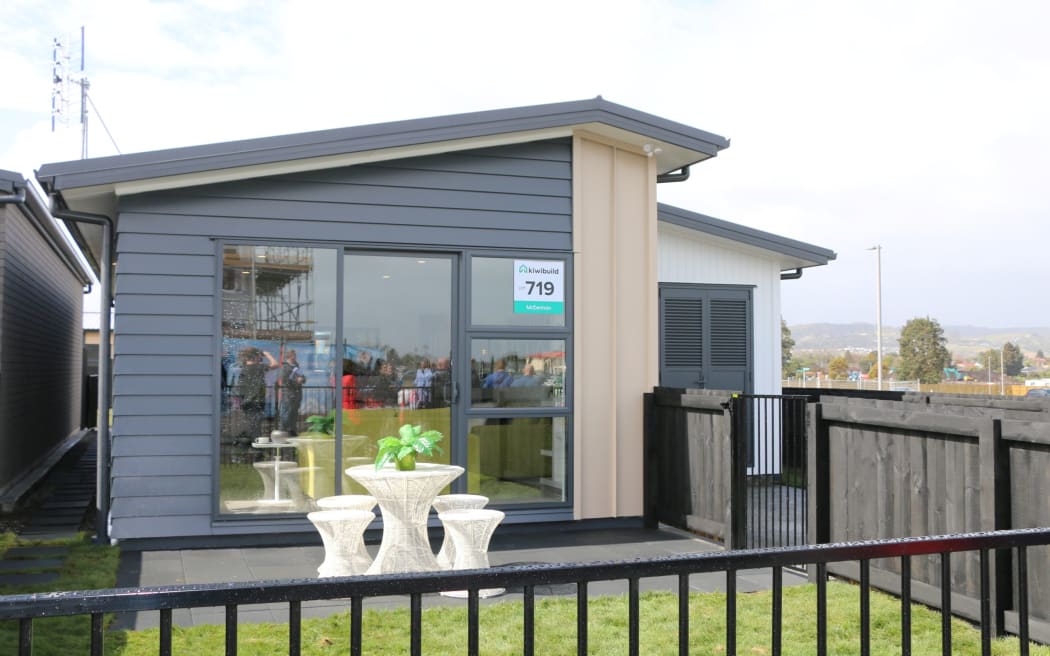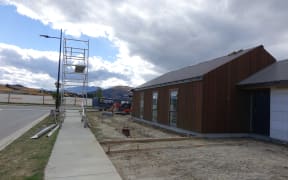Would someone who could raise $650,000 for a house deposit be considered a struggling first-home buyer and need a KiwiBuild house?
That's the situation for three people who've been given pre-approval to be part of the scheme.
Watch : Helen O'Sullivan, head of of delivery for KiwiBuild, speaking to Morning Report's Corin Dann
Each declared they could stump up with $650,000 with help from family members, and have annual incomes of less than $11,000.
At the other end of the scale, one applicant declared an income of $20 with no deposit, and was considered eligible.
The Housing Ministry released details of more than 500 pre-approved KiwiBuild buyers as of February this year, noting the information could contain input errors, after RNZ went to the Ombudsman.
That includes residency status, the number of people on each application, their income and the amount for a deposit.
RNZ went back to the KiwiBuild Unit to clarify what information was correct. It confirmed there was a group of pre-approved applicants who'd declared they could raise more than $300,000 for a deposit, including the three who said they could come up with $650,000 with the help of family.
It said none of them had yet purchased a KiwiBuild home.
A person who'd worked for KiwiBuild approached RNZ - concerned that the criteria and the system were set up in such a rush that there is huge potential for people, who are not struggling first-home buyers, to take advantage of the scheme.
One of their concerns was that the people for whom the scheme was clearly not intended were getting access to KiwiBuild houses - designed for those who would otherwise find it hard to get into the housing market.

Some KiwiBuild applicants who have been preapproved can afford to muster up deposits of $650,000 or no deposit at all. Photo: RNZ/ Anneke Smith
Sixteen applicants declared deposits of more than $200,000 with a number of others declaring more than $300,000.
This is not against the rules because there is no means testing for first-home buyers' deposits, as the KiwiBuild criteria are based on the KiwiSaver HomeStart grant.
But have the rules allowed those who are not the target of the policy to access the affordable homes?
There is an income cap for the scheme; $120,000 for sole purchaser and $180,000 for multiple buyers (more than one person can be on the application).
"I believe this income threshold enables the highest number of young families who struggle to purchase a modest starter home to be eligible, whilst staying true to public expectations about who should benefit from KiwiBuild and what would be a fair outcome," said Housing Minister Phil Twyford in an April 2018 Cabinet paper.
Another eligibility criteria is you either have to be a first-home buyer or a "second chancer" - someone who has previously owned their own home but who meets an asset test.
Depending on where they live a "second chancer" can have only have assets, including a cash deposit, of up to $120,000.
The paper also said the pre-qualification process was about "testing whether buyers meet the eligibility requirements to purchase a KiwiBuild dwelling and have the ability to raise the required finance".
However, one applicant declared an annual income of $20, with no deposit, another an income of $12,000 with a $50,000 deposit. These were both listed as sole applications.
The KiwiBuild Unit said before anyone was able to go ahead and buy a house after pre-approval their application was "checked and verified before they become eligible to buy a home ... this process picks up any errors that impact on their eligibility".
It said only one person actually had more than $300,00 in the bank for a deposit but they had not bought a KiwiBuild home.
One person who originally declared a deposit of more than $300,000 had bought a home, but they had made an input error in the pre-qualification process and their actual deposit was less than $100,000.
KiwiBuild head of delivery Helen O'Sullivan said some people who had declared a large amount for a deposit had made a mistake on the form, and had less money available than they'd stated.
Ms O'Sullivan said there was an income test for a KiwiBuild home but no asset test.
"[KiwiBuild homes] are not subsidised, what the scheme is doing is facilitating the delivery of modest and affordable starter homes - which you still have to pay for.
"So you still need sufficent income and sufficient financial backing to actually purchase the homes."
She said there were enough houses in the scheme for all who wished to buy.
"The reality is parents have been helping children to buy homes for a really long time .... there is no asset test on this because what we're trying to do is facilitate supply.
"That is where the market has been constrained."
Getting finance from a bank is a separate process from the eligibility requirements - and the programme isn't arranging finance.
People who are New Zealand citizens, permanent residents or "ordinarily resident" in New Zealand can apply for KiwiBuild.
About 70 percent of the applicants are citizens, about 22 percent permanent residents and nearly 8 percent in the third category who are people on a resident visa, have been in New Zealand for at least 12 months and are a tax resident.
Two applicants have no residency status in New Zealand, which is allowed under the rules if they're applying with someone who does meet the residency rules and is a spouse, civil union partner or de facto.
National's response to KiwiBuild pre-approval process
National's housing spokesperson Judith Collins has been critical of many aspects of the scheme, and said the amount of pre-approved applicants had raised even more questions.
"These are people who clearly do not need taxpayer assistance in terms of the subsidy that KiwiBuild is essentially giving," Ms Collins said.
"And it seems bizarre to me that they'd even be interested in a KiwiBuild house, other than the fact that they think they can get a better deal than they will on the open market."

National's housing spokesperson Judith Collins says the KiwiBuild Unit's preapproval scheme should be looked at more closely. Photo: RNZ / Ana Tovey
She said it was hard to see exactly how someone on low incomes could raise such big deposits.
"It's either that someone's inherited money, or someone's given it to them, or they've won lotto, or they've got it and some other means but it doesn't seem credible if people are declaring an income of around $15,000 or $20,000, that they suddenly turn up with hundreds of thousands of dollars in deposit."
It was a "rort", she said, and should be looked at more closely by an external agency like the Office of the Auditor General.
"I'm sure that the Auditor General will have this sort of scheme on his radar and it's the sort of thing where I think the Audit Office would be very interested in some of these very odd combinations of very low income, very high deposit," Ms Collins said.
"It just doesn't ring true."







